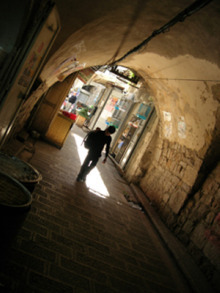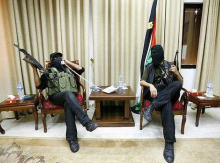Matt Rees's Blog - Posts Tagged "salaam-fayyad"
In Nablus, the price is right
 I was tucking into a slice of qanafi at my favorite vendor in the Nablus casbah yesterday when a gang of Palestinian reporters and officials intruded on my guilty pleasure. This was at Aqsa Sweets, which readers of THE SAMARITAN'S SECRET will know as the place favored by the hero of my Palestinian crime novels Omar Yussef because it has a perfect blend of the cheeses of different Syrian and Palestinian goats in its qanafi (topped by semolina and drenched in syrup.)
I was tucking into a slice of qanafi at my favorite vendor in the Nablus casbah yesterday when a gang of Palestinian reporters and officials intruded on my guilty pleasure. This was at Aqsa Sweets, which readers of THE SAMARITAN'S SECRET will know as the place favored by the hero of my Palestinian crime novels Omar Yussef because it has a perfect blend of the cheeses of different Syrian and Palestinian goats in its qanafi (topped by semolina and drenched in syrup.)Mayor Adly Yaish was among the crowd. As he steamed his way through a plate of qanafi, he informed me that he, the Nablus region's governor, and the city's police chief were touring the casbah to draw attention to a law soon to come into effect that'll make it mandatory for vendors to show their prices. It's one of the economic reforms introduced by Prime Minister Salaam Fayyad, a Nablus native, intended to change the chaotic and often corrupt nature of the Palestinian economy.
A few minutes of jawboning with me about their hopes that my books will show the true Nablus (I think they do, but I didn't remind them that I write crime fiction), a forkful of qanafi raised for the cameras, and then the dignitaries were off into the narrow alleys in search of price tags.
I settled in to complete my lunch -- not a balanced diet, I know, but then my mother doesn't read this blog so I don't have to pretend to be watching what I eat. I washed it down with tea from a fellow who wandered in with an enormous pot and a cup of sugar in his apron.
Nablus is famous throughout the Arab world as the best place for qanafi. And Aqsa Sweets is the best qanafi in Nablus, thus the best in the Arab world and, obviously, in the world. You wouldn't know it. The place is floor to ceiling white ceramic tiles, as though they expected to hose it down at the end of the day. Up front there are two big burners with wide trays of orange qanafi. The surly fat kid who serves you slings it onto the table as though he thought frisbees were made of hot goat's cheese and syrup.
As for price, nothing's marked. For 4 shekels (a bit more than a dollar), you get 125 grams of qanafi. It doesn't look like much, but if you try to eat more than that, you'll either stagger out hoping never to see another piece of the stuff in your life, or you might just curl up and die in the corner of sugar-shock.
I went up Mount Gerizim, one of the two mountains whose steep sides form the valley in which Nablus lies. At the top I found my old pal Hosny Cohen, a Samaritan priest, in exultant mood. He's shifting his Samaritan Museum and Cultural Center to a bigger room.
"I've had two tour groups this morning, each of forty people," he said, leaning on his cane and pushing his fez forward neatly over his brow. "I don't have energy for you."
Then he proceeded to talk for an hour without stopping. When I was about to leave, he came after me and said: "I forgot to show you the 'mezuza' we put above the door..."
Which is why I can't help liking the Middle East.
Published on March 16, 2010 10:54
•
Tags:
adly-yaish, aqsa-sweets, crime-fiction, dessert, food, goats, hosny-cohen, mayor, nablus, palestine, palestinian, prime-minister, qanafi, salaam-fayyad, samaritans, syria, the-samaritan-s-secret
Good times, danger signs in West Bank
 BETHLEHEM, West Bank — The good news is that the West Bank is normal — kind of — and that people are content — sort of. The bad news, the Palestine Liberation Organization thinks it’s responsible for the good news.
BETHLEHEM, West Bank — The good news is that the West Bank is normal — kind of — and that people are content — sort of. The bad news, the Palestine Liberation Organization thinks it’s responsible for the good news.Palestinian President Mahmoud Abbas, who’s also the Palestine Liberation Organization (PLO) chief, has decided to stamp down on the man who’s actually made life bearable in the West Bank, Prime Minister Salaam Fayyad, and his plan to declare a unilateral Palestinian state in 2011.
At a meeting of the Fatah Revolutionary Council, effectively the PLO’s ruling body, Abbas said last week that only the PLO was allowed to make decisions on behalf of the Palestinian people.
"It’s not the factions or the governments that take ownership of decisions," Abbas said.
Abbas wants to continue on the path that has led the Palestinians and the Israelis nowhere. So-called “proximity talks,” in which they talk via U.S. mediators, are supposed to start again soon. They’re unlikely to change anything.
Fayyad, who’s a political independent appointed to his post by Abbas mainly because the Americans insisted on it, announced his plan last year for the declaration of a state. The idea: truly to ready Palestinian institutions for independence and to dare Israel — and the U.S. — to oppose it.
Fayyad’s ability to clean up the economy and reform the security forces has made him popular among Palestinians. He’s also seen as untainted by the violence and corruption of the two main political parties, Abbas’s Fatah and the Hamas rulers of Gaza.
That makes him a potential rival to Fatah. PLO chiefs fear that if Fayyad declares a Palestinian state and the U.S. cheers, maybe its bankrollers in Washington and Oslo and Brussels will cut the PLO out of the power and money loop. That, after all, is what the PLO is all about. “organization” is the operative word in the name of the PLO, rather than “liberation."
A visit to Bethlehem this week delineates the precise choice on offer between Abbas and Fayyad.
In the Dehaisha Refugee Camp, less than a square mile that’s home to more than 16,000 poor Palestinians, there are bulletholes in the walls of the U.N. girls' school, left over from the second intifada. A reminder of the final bankruptcy of the PLO and its failure to convert itself from an outlaw band into a true government after the signing of the Oslo Peace Accords in 1993.
The casualties of that long descent into destruction are painted all over the walls. On the pedestrian bridge the girls cross to reach their school, there’s a 10-foot graffito of Sa'id Eid, masked and firing a mortar. He was killed by an Israeli Apache helicopter in 2003. As the girls come down on the other side, they pass another big stencil in black paint. This time it’s Ayat Akhras, at 16 the youngest female suicide bomber, who left her home in Dehaisha in 2002 to kill herself, a 17-year-old Israeli girl and an aging supermarket guard. She raises a pistol like a naif Bond girl.
At the corner, a falafel restaurant is decorated with murals of all the martyrs of the Palestinians, from Ghassan Kanafani, writer and Popular Front activist killed by the Israelis in Lebanon in 1972, to a collection of the intifada’s most famous victims, and above them Khalil Wazir, the Arafat lieutenant assassinated by Israel in 1988.
A continuation of that fatal litany is, frankly, what’s offered by the “proximity” talks. Because they’ll lead only to frustration, a sense that nothing can be achieved by negotiation, and a resultant impetus toward violence.
What’s the alternative?
Mike Canawati, one of Bethlehem’s leading businessmen, describes trade in his tourist shop on the road to the Church of the Nativity, the site of Jesus’s birth, as “excellent, really excellent.” That’s the result of Fayyad’s ability to convince the Israeli army that checkpoints can be lifted and his commitment to a higher level of training among Palestinian security forces, so that tourists don’t fear to enter Bethlehem as they did for much of the last decade.
It isn’t a total shift. The dangers are simply less immediately apparent. Canawati still sits at his desk flanked by a screen with 16 different closed-circuit images of the store, the alley behind it, his black Hummer parked at the side of the building.
Only the night before we met, he had welcomed 700 Italian diners in his banquet hall near the church. “We should be thankful to these people for coming to our town,” Canawati said. During the dinner, a group of Fatah people entered and unfurled banners protesting that the Italians would later hold a meeting with Israelis in Jerusalem. “I had a big argument with them,” he said, “and I threw them out.”
Back in Dehaisha, I took my son to a birthday party at a friend’s home. My friend spent nine years in an Israeli jail without charge. He was, in fact, in jail seven years ago when the birthday boy was born. Now he’s studying for a Master’s degree in law.
A clown inflated sausage-balloons and tied them into the shape of swords. I was strangely relieved that they weren’t bent into Kalashnikovs.
When the birthday cake came out, the clown’s assistant emerged dressed as SpongeBob SquarePants. She sang “Happy Birthday” in Arabic with the aid of ear-splitting amplification and did some unexpected SpongeBob belly dancing moves.
Whatever Abbas and his PLO cronies say, that’s the kind of reality we should be wishing on the people of Dehaisha.
Published on May 05, 2010 05:34
•
Tags:
abu-jihad, abu-mazen, ayat-al-akhras, bethlehem, church-of-the-nativity, dehaisha-refugee-camp, fatah-revolutionary-council, gaza, ghassan-kanafani, hamas, hummer, israel, khalil-wazir, mahmoud-abbas, middle-east, palestine, palestinians, peace-talks, plo, refugees, salaam-fayyad, spongebob-squarepants, west-bank
Hamas rebuilds in West Bank
 Hamas is steadily rebuilding its power in the West Bank, stockpiling weapons and material underground, biding its time for a renewal of the conflict with its Fatah rivals.
Hamas is steadily rebuilding its power in the West Bank, stockpiling weapons and material underground, biding its time for a renewal of the conflict with its Fatah rivals.Palestinian security officials have been telling me this for some time, and they are frankly filled with fear and foreboding. Palestinian President Mahmoud Abbas mentioned it again in an interview with the Arabic newspaper al-Sharq al-Awsat during the week, accusing Hamas of smuggling weapons to the West Bank.
The Hamas buildup is one of the reasons Abbas has allowed his independent prime minister, Salaam Fayyad, to stay in his job so long, despite the popularity Fayyad is accruing at the expense of Abbas’s Fatah. Fayyad has managed to reform the Palestinian security forces, persuading the U.S. to give tens of millions of dollars in security aid.
Without those reforms, the Palestinian security forces would either fold in minutes if faced with a Hamas uprising in the West Bank, or would even join Hamas to save themselves.
So it’s significant that after 10 days in which Abbas repeatedly berated Fayyad’s plan to declare a Palestinian state in 2011 — which would convince the world that if Fayyad could create a state, Fatah might’ve become irrelevant and therefore not worth the cash it siphons away — the president also highlighted the urgency of Fayyad’s most important achievement. (He first talked about it in an interview with a Kuwaiti newspaper in January, when he said he had “verified information” that Hamas planned to take over the West Bank by force.)
Of course, U.S. and European security advisers to the Palestinian security forces don’t claim to have made much of their new charges. If Hamas is able to recreate its West Bank network, the Palestinian security forces will hold up their advance for only about a week, they estimate.
That’s not bad, given that two years ago the Palestinian security forces were good for nothing much at all. A week might also buy time for a cease-fire, which might in turn preclude an Israeli invasion of the West Bank — it’s unimaginable that the Israelis would allow the West Bank to come under Hamas control.
Part of Abbas’ accusation against Hamas is that its leadership is allowing radical young military leaders to blow off steam by plotting a West Bank armed takeover. In return, those military leaders aren’t pushing as hard for rocket attacks against Israel from Gaza.
The Hamas leaders in Gaza are keen to avoid such attacks, because they’re barely recovering from the hammering they received a year and a half ago at the hands of the Israeli army. The cause of that war, remember, was rocket attacks from Gaza into Israel.
Hamas kicked Fatah out of the Gaza Strip in 2007. Fatah people were shot and tortured, and a few were tossed from tall buildings. Since then, both sides have engaged in a low-flame civil war which involves lengthy detentions without trial, torture and kneecappings.
The West Bank looks like an attractive playground into which Hamas can shove its angrier military types. After all, if the Fatah cops fail to intercept a Hamas attack against Israelis in or from the West Bank, Israel usually blames Fatah rather than Hamas.
Within the Izzedine al-Qassam Brigades, the Hamas military wing, support has been increasing for more militant action — yes, more militant than the leadership which ultimately wants to eradicate Israel but is prepared to wait a long time to do so. (In Gaza, that counts as dovishness...)
Those military leaders have turned, according to international analysts, to a brand of Islam more commonly called “Salafi.” In short, it’s the extreme Islam favored by many in the Gulf States. It’s quite alien to most Palestinians, who are conservative but not particularly fundamentalist in their religion. Still, once a military type gets stirred up, the hard line often looks appealing.
Abbas better hope he hasn’t leaned too hard on Fayyad. The week of grace his prime minister’s reforms will have bought him in the event of an attempted coup by Hamas might prove to be the difference between a nice retirement at his house in Dubai and the kind of kangaroo justice meted out by the Islamist in Gaza three years ago.
(I posted this on Global Post.)
Published on May 09, 2010 23:09
•
Tags:
abu-mazen, crime-fiction, dubai, fatah, gaza, global-post, hamas, intifada, israel, israeli, izzedine-al-qassam-brigades, mahmoud-abbas, middle-east, palestine, palestinians, plo, salaam-fayyad, salafi, sharq-al-awsat, west-bank



